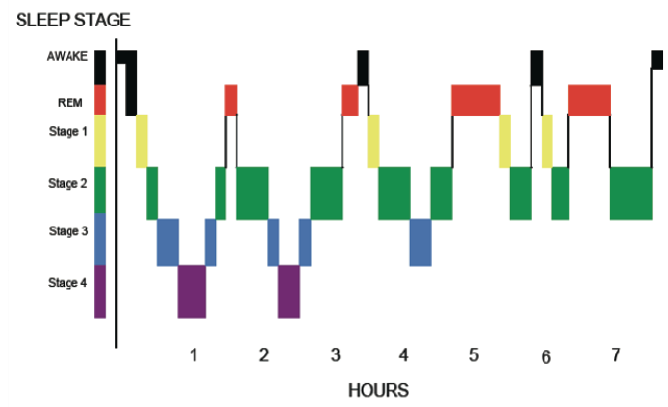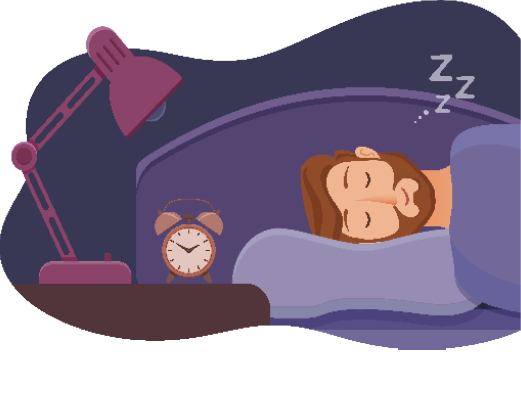The Significance of Sleep

S hakespeare understood a few things—the significance of sleep was one of them. There is no doubt that sleep quality and quantity is a significant issue for the Bar.
In recent times there has been an explosion in our understanding of sleep—what sleep does for us, and what compromised sleep might do to us. 1 Some of us, perhaps many of us, have not given sleep sufficient respect or attention. Some of us, perhaps many of us, have sacrificed sleep to the demands of our work. For some of us, perhaps many of us, our work (or intrusive thoughts about it) disrupts our sleep. 2
Scientists have come to better understand, appreciate and pronounce upon the significance of sleep. Matthew Walker is one of these scientists. Walker’s book Why We Sleep: The New Science of Sleep and Dreams 3 is full of interesting and informative material. Walker has spent a long time in sleep research. Walker says:
Sleep is not the absence of wakefulness. It is far more than that … our night-time sleep is an exquisitely complex, metabolically active and deliberately ordered series of unique stages. Numerous functions of the brain are restored by, and depend upon, sleep. 4
Neuroscience Research Australia (NeuRA) is one of the research institutes which conducts research locally into sleep. 5 NeuRA introduces its work on sleep with a statement on the fundamental significance of sleep:
Sleep is controlled by the brain and is essential for human life. Impaired sleep adversely affects every organ in the body. A sleep disorder occurs when sleep patterns are disrupted. They are often serious enough to impact on a person’s physical, mental, social and intellectual functioning. Sleep apnoea and insomnia are the most common sleep disorders. Other examples of sleep disorders include restless legs syndrome (RLS) and narcolepsy. 6
As NeurRA suggests, we all should perhaps better appreciate the importance of sleep to our physical, mental, social and intellectual functioning. Having a good night’s sleep has an important part to play in our carrying out our roles as barristers.
Ninety-Minute Cycles
We sleep in 90-minute cycles. Two cycles, and we’ve been asleep for three hours. Four cycles, and six hours or so have passed. All of us probably need at least five cycles—about seven and a half hours per night—to ensure we get the benefits we should be getting from sleep. For some of us, six cycles—nine hours—might even be better. A picture tells the story. 7
The different colours depict the different phases manifest in different brain wave patterns .8
In the first stage, we go down into what is known as ‘non-REM sleep’. We go through different phases in our non-REM sleep—the yellow, the green, the blue and down to purple, a least in the early cycles. We then move out of non-REM sleep into REM or dream sleep—red for REM. All mammals have REM/dream sleep. Reptiles, on the other hand, do not.
When in REM sleep, we are in a remarkable state. We hallucinate and have delusions. In a way this almost mimics being psychotic. All our voluntary muscles are paralysed. Perhaps evolution has railed against those who acted out their dreams.
As we go from our first cycle to subsequent cycles there is more REM sleep (red) and shallower non-REM sleep (No purple, then no blue, and more green). We might even wake a little between cycles—the black bits.
Different things happen in the different phases of sleep.

Your chronotype—morning lark or night owl or somewhere in the middle?
What chronotype we are is strongly influenced by our genetic make-up. 9
About four out of ten of us are Morning Larks. For Morning Larks, midnight is very much a contraction for middle of the night. Another three or so of us are Night Owls. Another three or so are somewhere in the middle. Walker tells us ‘… night owls are not owls by choice. They are bound to a delayed schedule by unavoidable DNA hardwiring. It is not their conscious fault, but rather their genetic fate.’ 10
We might benefit from working out where we fall in the chronotype taxonomy. Perhaps, as Walker notes, Night Owls should not be getting up too early: ‘When a night owl is forced to wake up too early, their prefrontal cortex remains in a disabled, ‘offline’ state. Like a cold engine after an early-morning start, it takes a long time before it warms up to operating temperature, and before that will not function efficiently.’ 11 Morning Larks, on the other hand, might retire for the night at 9pm and wake at 5am. 12
Recognising your chronotype and adopting a sleep regimen that aligns with your chronotype will improve the efficacy of your sleep.
Glymphatics and The Wash Cycle—getting rid of debris!
In 2012 glymphatics were discovered. 13 This discovery is likely to prove to be incredibly significant. Glymphatics are a drainage system for the brain—they carry away debris and waste products. Glymphatics operate optimally in the deep phases of non-REM sleep (purple and blue)—The Wash Cycle. It appears that if we get into these phases, our brain cells shrink a touch and the Glymphatic channels open up a bit. 14 It has been postulated that β-Amyloid protein—the misfolded protein that is prevalent in the brains of those suffering Alzheimer’s—might be taken away in the deep phases of non-REM sleep when our Glymphatic channels are most operative. 15
The Journal of the American Medical Association recently carried a little piece: ‘Does Sleep Flush Wastes from the Brain?’ where it was suggested:
Why do people sleep? How does the brain eliminate waste products? Increasingly, it appears that the answers to these questions may be linked: a principal reason for sleep may be to activate the newly discovered glymphatic system to flush waste products from the brain. 16
The debris includes β-Amyloid protein (Aβ) and Tau:
Up to 60% of large proteins and solutes are removed via the glymphatic pathway. Removal of Aβ and tau mitigates the formation and growth of Aβ-rich plaques and prevents the seeding and spreading of tau filaments—2 key features of [Alzheimer’s Dementia]. Perhaps more important, the glymphatic system flushes out the small, soluble forms of Aβ and tau that may be neurotoxic. 17
Getting rid of debris is not the sole function/benefit of sleep. There is a plethora of functions/benefits, too many and too complex to be simply listed here. Walker’s book Why We Sleep or one the podcasts he features on is a place to start having a glimpse into the complexity of sleep and its significance.

Sleep and memories
Memories and memory processes are complex. There is no single memory system. Sleep is critical for how our memory systems function.
Walker speaks of reception, reflection and integration:
When it comes to information processing, think of the wake state principally as reception (experiencing and constantly learning the world around you), non-REM sleep as reflection (storing and strengthening those raw ingredients of new facts and skills), and REM sleep as integration (interconnecting these raw ingredients with each other, with all past experiences, and, in doing so, building an ever more accurate model of how the world works, including innovative insights and problem solving abilities). 18
Walker writes of ‘our memory storage crisis’:
… sleep may elegantly manage and solve our memory storage crisis, with the general excavatory force of non-REM sleep dominating early, after which the etching hand of REM sleep blends, interconnects, and adds details. Since life’s experience is ever changing, demanding that our memory catalog be updated ad infinitum, our autobiographical sculpture of stored experience is never complete. As a result, the brain always requires a new bout of sleep and its varied stages each night so as to auto-update our memory networks based on the events of the prior day. This account is one reason (of many, I suspect) explaining the cycling nature of non-REM and REM sleep, and the imbalance of their distribution across the night. 19
The notion of ‘sleeping on it’ may well reflect something profound. We have all perhaps had the experience of new and better ideas emerging (from our subconscious) and appearing in our cognitive consciousness the next morning. We all have a ‘smear’ of cognitive consciousness overlying our subconscious.
Freud was not wrong when he said:
The conscious mind may be compared to a fountain playing in the sun and falling back into the great subterranean pool of the subconscious from which it rises. 20
Sleep, your immune system and risks of cancer
The World Health Organisation has declared shift work to be a carcinogen. Walker claims ‘routinely sleeping less than six or seven hours demolishes your immune system, more than doubling your risk of cancer.’ 21
Sleep and gene expression
Epigenetics may well be one of the most significant new things to emerge in recent decades. 22 We are not simply a genetic rollout. The way we live influences our genetic expression. Our sleep, what and when we eat, how we move and how we connect with others matter to our genetic expression—this and more is epigenetics.
Overnight therapy!
Walker says: ‘REM-sleep dreaming offers a form of overnight therapy. That is, REM-sleep dreaming takes the painful sting out of difficult, even traumatic, emotional episodes you have experienced during the day, offering emotional resolution when you awake the next morning.’ 23
What is lost is lost!
There is no credit-debit system for sleep. We cannot catch up on lost sleep. What is lost is lost.
We might not be able to get Matthew Walker to speak to us. However, there are some wonderful sleep scientists in Australia and we very much hope to bring you a presentation on the significance of sleep this year, as part of the Wellbeing Committee’s Eat Sleep Move initiative.
Walker's Twelve Tips for Healthy Sleep
Stick to a sleep schedule
Exercise is great, but not too late in the day
Avoid caffeine 24 and nicotine
Avoid alcoholic drinks before bed
Avoid large meals and beverages late at night
If possible, avoid medicines that delay or disrupt your sleep
Don’t take naps after 3pm
Relax before bed
Take a hot bath before bed
Have a dark, cool and gadget-free bedroom
Have the right sunlight exposure (try and get natural sunlight for 30 minutes each day)
Don’t lie in bed awake, get up and do some relaxing activity until you feel sleepy. 25

ENDNOTES
1The significance of sleep is coming to wider appreciation. In April 2019, the Commonwealth issued the report of the House of Representatives Standing Committee in Health, Aged Care and Sport titledBedtime Reading: Inquiry into Sleep Health Awareness in Australia. The foremost recommendation was that ‘the Australian Government prioritizes sleep health as a national priority and recognise its importance to health and wellbeing alongside fitness and nutrition.’ (p.xxi)
2The Well Being Quality of Working Life Survey of NSW Barristers reports only a third of respondents ticked the box: ‘I am able to get the sleep I need each night.’
3Matthew Walker,Why We Sleep: The New Science of Sleep and Dreams(2017). You can catch Walker speaking with Joe Rogan in a classic chat— https://www.youtube.com/watch?v=pwaWilO_Pig. Peter Attia has also interviewed Matthew Walker—https://www.youtube.com/watch?v=VkX3nYpMr2g. . Peter Attia has also interviewed Matthew Walker—.
4Walker,Why We Sleep, p.108.
5Her Honour Justice Anna Katzmann is the Chairperson of the Governing Council of NeuRA.
6NeuRA—Understanding how to correct interrupted sleep patterns: What we knowhttps://www.neura.edu.au/health/sleep-disorders/?gclid=CjwKCAjwoNuGBhA8EiwAFxomA-fqcr4c_LyiAKD0BgeGSQ9r-6JVp-Zz_G0ZTpk9rr1aiy8VxlGy2hoCxtwQAvD_BwE. .
7This is an image used by Professor Sharon Naismith of the University of Sydney. Professor Naismith is at the forefront of looking at sleep and cognitive decline and dementia.
8Brain waves are picked up on electroencephalograms (EEGs). As Walker explains, EEGs listening to brains is akin to dangling a microphone over a large football stadium filled with thousands of fans.
9 Walker,Why We Sleep, page p.21.
10Ibid., p.20.
11Ibid., p.21.
12Ibid., p.22.
13Xei et al ‘Sleep Drives Metabolic Clearance from the Adult Brain’,Science 342, no 6156 (October 2013) .
14Xei and colleagues report that when their mice were in the deep phases of their non-REM sleep the space between their brain cells increased by 60 per cent, with the channels opening.
15Margaret Thatcher proclaimed she slept four hours each night, supposedly declaring, ‘sleep is for wimps’. There is no science in this: but Margaret Thatcher did develop Alzheimer’s.
16Komaroff, A. ‘Does Sleep Flush Wastes from the Brain?’Journal of the American Medical Association (JAMA) June 1 2021, Volume 325, Number 21 .
17Ibid.
18Walker,Why We Sleep, p.53.
19Ibid., p.45.
20Sigmund Freud,The Interpretation of Dreams (1900).
21Walker,Why We Sleep, p.3.
22Autophagy is up there too but that is another story!
23Walker,Why We Sleep, p.207.
24Caffeine blocks adenosine binding to your adenosine receptors, adenosine being critical to your being able to sleep.
25Walker'sTwelve Tips for Healthy Sleep are in his Appendix inWhy We Sleep at pages 341 and 342 in a little more detail.